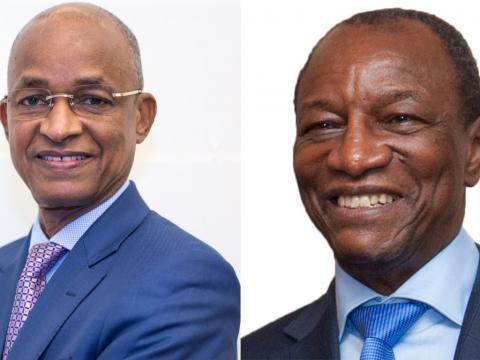By Kemo Cham and Mabinty M. Kamara
Guineans are expected to vote for president this weekend, Sunday October 18, in what promises to be a crucial election.
Incumbent president Alpha Conde is seeking a third term, after controversially changing the country’s constitution to allow him run at the end of his two-five year terms.
He faces 12 other candidates, with his major challenger being veteran opposition leader Cellou Dalein Diallo of the Union of Democratic Forces of Guinea (UFDG).
Conde, who is running under the ticket of the Rally of the Guinean People (RPG), first came to power in 2010 in an election that ended nearly three years of military rule and, before that, decades of autocracy. The coup was staged following the death of longtime leader, Lansan Conteh.
Conde is regarded as the first president of Guinea who was elected democratically in a pluralistic electoral system.
In 2015, the former university professor was again re-elected.
But the opposition, particularly UFDG, never accepted the outcome of all two elections, citing irregularities.
Since 2010, all elections held in Guinea have been marred by violence. This one too promises same.
Already pro-democracy campaigners and opposition political parties say over 90 people have died since Conde floated the idea of running for third term in October 2019.
This week a coalition of rights campaigners - the Defence of the Constitution (FNDC), released its latest data on the violence, which indicates that a total of 92 protesters have been killed since the start of the protests. About 45 of the victims, according to FNDC, were protesters shot dead by security forces. It said that eight of the bodies remain unidentified.
Rights groups, including the watchdog Amnesty International, have accused the authorities of failing to hold security forces accountable for their actions in responding to the anti-government demonstrations.
Amnesty also said that at least 70 people were detained incommunicado as of July 2020 “for only exercising their right to freedom of expression or peaceful assembly and denouncing authoritarian excesses of power,” according to a 63-page report published at the beginning of this month.
“All these human rights violations went unpunished,” the report notes, adding that the government failed to investigate the killings and hold the perpetrators to account.
The Guinean government rejected the report, describing it as lacking neutrality.
But the opposition have remained determined.
Diallo is campaigning on the promise of revitalizing the country’s economy, which he said was broken by the alleged 10-year misrule of Conde.
The president, on the other hand, said he wants to continue his “good” work for the people of Guinea.
But for the ordinary Guineans, Sunday is a watershed moment as they have a chance to determine the direction they want their country to take, said civil society activist, Alhoussein Fadiga.
Exactly a week before the vote, on Monday October 12, a major report on the performance of the incumbent president by the Association of Guinean Bloggers, known by its French Acronym ABLOGUI or l'Association des blogueurs de #Guinée, which is headed by Fadiga, painted a damning picture of the incumbent in terms of fulfilment of his campaign promises.
Through its project called Lahidi, ABLOGUI tracked the promises made by Conde while campaigning in the 2015 elections. The group said out 315 promises of the president, only 14 were fulfilled.
This report was cited by Diallo on Wednesday, October 14.
Fadiga told Politico on Thursday that the work of his organization hold the answer to the problems Guineans faced presently between the choices available to them in this election, only if they had paid a little attention to it.
ABLOGUI has published six reports on the Conde administration since 2015.
Mr Fadiga was unhappy that their latest report was shared by Diallo only now, six years after they first began working on the project.
“If only politicians, citizens, everyone have been interested since our first report, I don’t think we would have been talking about too much debates…I don’t think we would have been here today,” he said.
But despite his apparent desperation, the activist however hope that their work can have a positive influence on the choices the Guineans have to make on Sunday, calling on them to turn out in large numbers to vote.
“What I can say to Guinean people is that on the 18th of October, everyone who has voters card should go out and vote. That’s the only way you can have a voice and you can make a complaint after,” he added.
Copyright © 2020 Politico Online








